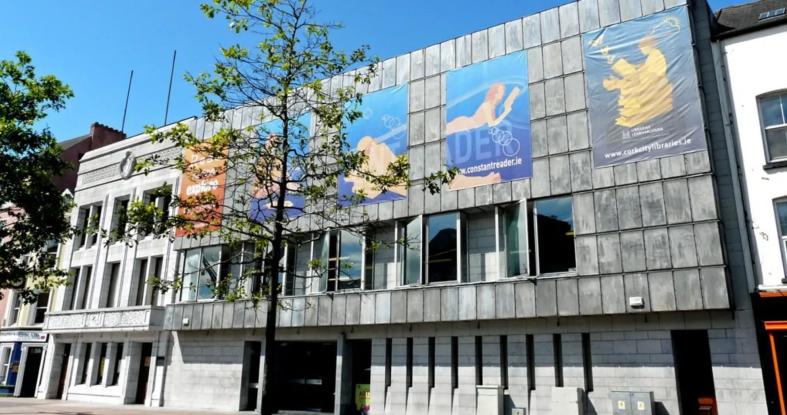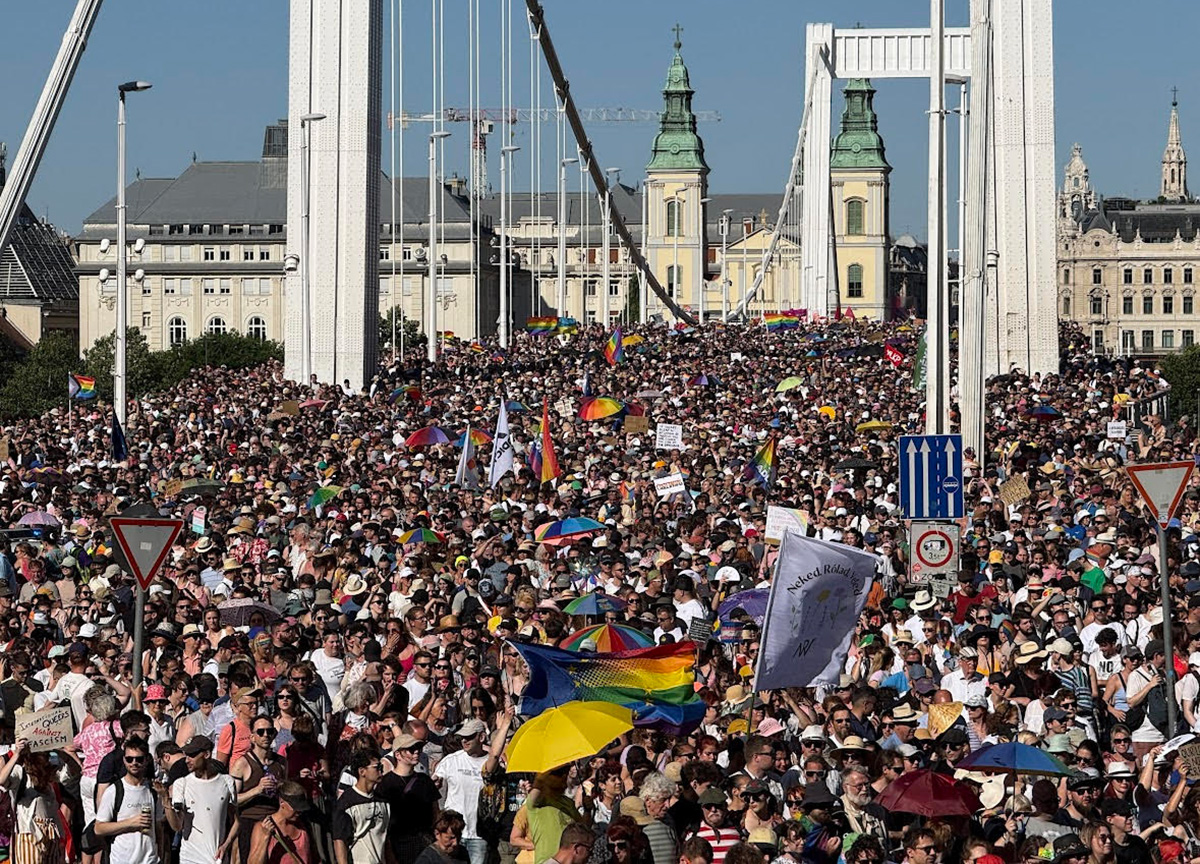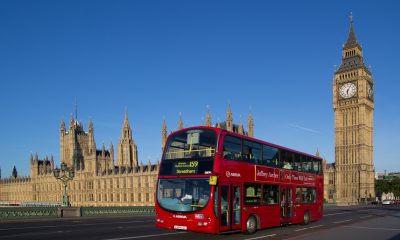World
LGBTQ news from Europe and Asia
Pro-democracy activist Jimmy Sham wins legal victory in Hong Kong

Greece
Some parents of students at a primary school in Corinth, a Greek city 48 miles west of Athens, are outraged after discovering that after a renovation, maintenance and painting of the building facilities, the undersides of balconies of the school appeared to have been enblazened with Pride flags.
Posting pictures to Facebook, the Parents’ Association of the 2nd Primary School of Corinth’s conservative members sent letters of complaint addressed to the city government, the Directorate of Primary Education and the school’s management.

The city’s deputy mayor, Yannis Gezerlis, responded to the incident, clarifying that the new paint scheme was not about the Pride colors and the LGBTQ community but about the colors of the iris or the sky arc symbolizing.
“Let me remind you here that the colors of the LGBT Pride flag; have the same arrangement as the rainbow but they are six and not seven like the colors of the iris which also includes blue, and there was rather than only an established identification of childhood and education, rebirth with the knowledge symbolized by the rainbow, and where it existed before the LGBTI community appeared,” he said adding: “And of course we cannot uncritically erase the past like this because it looks like something we oppose.”
Slovakia
Early parliamentary elections are scheduled to be held in Slovakia on Sept. 30, and the European People’s Party, (EPP) a center-right, major pro-European political group, has endorsed KDH, the Christian-democratic political party in Slovakia that is a member of the EPP, despite KDH Leader Milan Majersk’s homophobic public comments and position.
During a pre-election TV debate ahead of the snap elections at the end of this month, in response to a question from the audience, Majersk referred to LGBTQ people as an “ideology” a “scourge” to the country as bad as corruption in government.
“Both are the misfortune of any country, not just Slovakia – both corruption and LGBTI. They are scourges that are destroying the country. Any country,” Majerský said. In a Facebook post after the debate Majerský attempted to walk back his harsh rhetoric writing that that he meant LGBTQ “ideology,” not people.
Andrea Letanovská, leader of Demokrati, another EPP-affiliated party from Slovakia, also echoed the criticism, reminding that “hateful words can kill,” as two young people were shot dead in a terrorist attack outside the Tepláreň gay bar last October.
“To hear this from someone who stands for democratic and Christian values, from someone who is supposed to love his neighbor, it is very sad indeed,” said Letanovská.
Ukraine
Instead of a Pride parade at the end of August, LGBTQ activists tied cardboard figures to trees in the Ukrainian city of Kharkiv. Co-organizer Sofia said they represented people “who cannot join the march for some reasons.”
“I think that people should be protected, especially now, during the war, when anything can happen at any time. We are not immune to anything,” she said.
According to the Kharkiv Pride Instagram account, only 100 people were able to register for the event for security reasons.
United Kingdom
Appearing on “Piers Morgan Uncensored” on Monday, London’s LGBTQ-friendly mayor, Sadiq Khan, sparred with the conservative presenter and journalist after Morgan asked the mayor to define a woman. This question has become a anti-transgender dog whistle for TERFs and “gender criticals” in Britain who are opposed to transgender rights.
Morgan has made several public statements in opposition to trans rights in the U.K. Although the mayor was not on the show discuss trans or women’s issues, he took the opportunity to insist that trans women are women.
“I answer that question knowing full well that there are people watching this who have gender dysphoria and have concerns in relation to this issue,” Khan said adding: “A woman, when it comes to biology and sex, is an adult girl,” he continued. “There are some women who have gender dysphoria and trans women can also be women as well.”
Ireland
Counter protesters in Corcaigh, Ireland’s second largest city, surrounded the Cork City Library to shield patrons and staff from a far-right protest occurring outside of the building.

PinkNewsUK reported that on Sept. 2 about 300 people turned out in support of the library and its staff, and in opposition to the Ireland Says No rally, which was organized by conservative groups.
The conservative groups and far right protestors are angered over LGBTQ books and want them removed. The city had previously been forced to shut the library during another anti-LGBTQ book demonstration, out of fear for the safety of library staff.
Speaking to CorkBeo, Sinn Féin Councilor Mick Nugent said: “For me, it’s primarily in support of library workers in terms of what they’ve had to put up with over the past number of months. The library is open today, which is good, business as usual.”
“It’s about equality, it’s about liberty, it’s about fraternity and it’s about diversity. We’re supporting all communities that decided to make Cork their home.”
China
Pro-democracy activist Jimmy Sham won a partial victory in the Court of Final Appeal, Hong Kong’s high court, when it ruled this week that the government formulate an alternative framework for same-sex couples seeking legal recognition as the court refused to recognize same-sex marriages which are not currently allowed.
A poll this year found that 60 percent of Hong Kongers supported same-sex marriage, compared to just 38 percent a decade ago France 24/AFP reported.
Sham, 36, who is one of dozens of activists behind bars awaiting prosecution under the Beijing-imposed Hong Kong security law on charges unrelated to LGBTQ rights, had twice failed to convince the courts that Hong Kong should legally recognize his marriage to a same-sex partner, which was registered in New York nearly 10 years ago.
Tuesday’s ruling said that the government’s failure to actively provide alternative options — like civil unions — for same-sex partners violates their rights.
“The absence of legal recognition of (same-sex partners’) relationship is apt to disrupt and demean their private lives together in ways that constitute arbitrary interference,” the court said in its ruling.
LGBTQ rights in China have steadily eroded as the government has cracked down over the past several years.
In Asia only Nepal and Taiwan recognize same-sex marriage while in South Korea lawmakers have recently introduced legislation that would recognize same-sex partnerships AFP also noted.
Rights advocacy has partly gone underground after Beijing imposed a national security law on Hong Kong in 2020, following huge and sometimes violent pro-democracy protests in the finance hub.
India
Anaya Bangar challenges ban on trans women in female cricket teams
Former Indian cricketer Sanjay Bangar’s daughter has received support

Anaya Bangar, the daughter of former Indian cricketer Sanjay Bangar, has partnered with the Manchester Metropolitan University Institute of Sport in the U.K. to assess her physiological profile following her gender-affirming surgery and undergoing hormone replacement therapy.
From January to March 2025, the 23-year-old underwent an eight-week research project that measured her glucose levels, oxygen uptake, muscle mass, strength, and endurance after extensive training.
The results, shared via Instagram, revealed her metrics align with those of cisgender female athletes, positioning her as eligible for women’s cricket under current scientific standards. Bangar’s findings challenge the International Cricket Council’s 2023 ban on transgender athletes in women’s cricket, prompting her to call for a science-based dialogue with the Board of Control for Cricket in India and the ICC to reform policies for transgender inclusion.
“I am talking with scientific evidence in my hand,” Bangar said in an interview posted to her Instagram page. “So, I hope, this makes an impact and I will be hoping to BCCI and ICC talking with me and discussing this further.”
On Nov. 21, 2023, the ICC enacted a controversial policy barring trans women from international women’s cricket. Finalized after a board meeting in Ahmedabad, India, the regulation prohibits any trans player who has experienced male puberty from competing, irrespective of gender-affirming surgery or hormone therapy. Developed through a 9-month consultation led by the ICC’s Medical Advisory Committee, the rule aims to safeguard the “integrity, safety, and fairness” of women’s cricket but has drawn criticism for excluding athletes like Canada’s Danielle McGahey, the first trans woman to play internationally. The policy, which allows domestic boards to set their own rules, is slated for review by November 2025.
Bangar shared a document on social media verifying her participation in a physiological study at the Manchester Metropolitan University Institute of Sport, conducted from Jan. 20 to March 3, 2025, focused on cricket performance. The report confirmed that her vital metrics — including haemoglobin, blood glucose, peak power, and mean power — aligned with those of cisgender female athletes. Initially, her fasting blood glucose measured 6.1 mmol/L, slightly above the typical non-diabetic range of 4.0–5.9 mmol/L, but subsequent tests showed it normalized, reinforcing the study’s findings that her physical profile meets female athletic standards.
“I am submitting this to the BCCI and ICC, with full transparency and hope,” said Bangar. “My only intention is to start a conversation based on facts not fear. To build space, not divide it.”
In a letter to the BCCI and the ICC, Bangar emphasized her test results from the Manchester Metropolitan University study. She explained that the research aimed to assess how hormone therapy had influenced her strength, stamina, haemoglobin, glucose levels, and overall performance, benchmarked directly against cisgender female athletic standards.
Bangar’s letter to the BCCI and the ICC clarified the Manchester study was not intended as a political statement but as a catalyst for a science-driven dialogue on fairness and inclusion in cricket. She emphasized the importance of prioritizing empirical data over assumptions to shape equitable policies for trans athletes in the sport.
Bangar urged the BCCI, the world’s most influential cricket authority, to initiate a formal dialogue on trans women’s inclusion in women’s cricket, rooted in medical science, performance metrics, and ethical fairness. She called for the exploration of eligibility pathways based on sport-specific criteria, such as haemoglobin thresholds, testosterone suppression timelines, and standardized performance testing. Additionally, she advocated for collaboration with experts, athletes, and legal advisors to develop policies that balance inclusivity with competitive integrity.
“I am releasing my report and story publicly not for sympathy, but for truth. Because inclusion does not mean ignoring fairness, it means measuring it, transparently and responsibly,” said Bangar in a letter to the BCCI. “I would deeply appreciate the opportunity to meet with you or a representative of the BCCI or ICC to present my findings, discuss possible policy pathways, and work towards a future where every athlete is evaluated based on real data, not outdated perceptions.”
Before her transition, Bangar competed for Islam Gymkhana in Mumbai and Hinckley Cricket Club in the U.K., showcasing her talent in domestic cricket circuits. Her father, Sanjay Bangar, was a dependable all-rounder for the Indian national cricket team from 2001 to 2004, playing 12 test matches and 15 One Day Internationals. He later served as a batting coach for the Indian team from 2014 to 2019, contributing to its strategic development.
Cricket in India is a cultural phenomenon, commanding a fanbase of more than 1 billion, with more than 80 percent of global cricket viewership originating from the country.
The International Cricket Council, the sport’s governing body, oversees 12 full member nations and more than 90 associate members, with the U.S. recently gaining associate member status in 2019 and co-hosting the 2024 ICC Men’s T20 World Cup. The BCCI generated approximately $2.25 billion in revenue in the 2023–24 financial year, primarily from the Indian Premier League, bilateral series, and ICC revenue sharing. The ICC earns over $3 billion from media rights in India alone for the 2024–27 cycle, contributing nearly 90 percent of its global media rights revenue, with the BCCI receiving 38.5 percent of the ICC’s annual earnings, approximately $231 million per year.
Women’s cricket in India enjoys a growing fanbase, with over 300 million viewers for the Women’s Premier League in 2024, making it a significant driver of the sport’s global popularity. The International Cricket Council oversees women’s cricket in 12 full member nations and over 90 associate members, with the U.S. fielding a women’s team since gaining associate status in 2019 and competing in ICC events like the 2024 Women’s T20 World Cup qualifiers. The BCCI invests heavily in women’s cricket, allocating approximately $60 million annually to the WPL and domestic programs in 2024–25, while contributing to the ICC’s $20 million budget for women’s cricket development globally. India’s media market for women’s cricket, including WPL broadcasting rights, generated $120 million in 2024, accounting for over 50 percent of the ICC’s women’s cricket media revenue.
“As a woman, I feel when someone says that they are women, then they are, be trans or cis. A trans woman is definitely the same as a cis woman emotionally and in vitals, and specially, when someone is on hormone replacement therapy. Stopping Anaya Bangar from playing is discrimination and violation of her rights. It is really sad and painful that every transwoman need to fight and prove their identity everywhere,” said Indrani Chakraborty, an LGBTQ rights activist and a mother of a trans woman. “If ICC and BCCI is stopping her from playing for being transgender, then I will say this to be their lack of awareness and of course the social mindsets which deny acceptance.”
Chakraborty told the Blade that Bangar is an asset, no matter what. She said that the women’s cricket team will only benefit by participation, but the discriminating policies are the hindrance.
“Actually the transgender community face such discrimination in every sphere. In spite of being potent, they face rejection. This is highly inhuman. These attitudes is regressive and will never let to prosper. Are we really in 2025?,” said Chakraborty. “We, our mindset and the society are the issues. We, as a whole, need to get aware and have to come together for getting justice for Anaya. If today, we remain silent, the entire community will be oppressed. Proper knowledge of gender issues need to be understood.”
The BCCI and the International Cricket Council have not responded to the Blade’s repeated requests for comment.
El Salvador
La marcha LGBTQ desafía el silencio en El Salvador
Se realizó el evento en San Salvador bajo la lluvia, pero con orgullo

SAN SALVADOR, El Salvador — El reloj marcaba el mediodía cuando los primeros colores del arcoíris comenzaron a ondear frente a la emblemática Plaza del Divino Salvador del Mundo. A pesar de la incertidumbre generada en redes sociales, donde abundaban los rumores sobre una posible cancelación de la marcha por la diversidad sexual, la ciudad capital comenzaba a llenarse de esperanza, de resistencia y de orgullo.
Este año, la Marcha del Orgullo LGBTQ+ en El Salvador se desarrolló en un contexto tenso, en medio de un clima político que reprime y silencia a las voces disidentes.
“Aunque las estadísticas digan que no existimos, viviendo en El Salvador, un país donde hoy, después de décadas de avances, defender los derechos humanos es de nuevo una causa perseguida, criminalizada y silenciada”, afirmaron representantes de la Federación Salvadoreña LGBTQ+.
A pesar de la cancelación del festival cultural que usualmente acompaña la marcha, los colectivos decidieron seguir adelante con la movilización, priorizando el sentido original de la actividad: salir a las calles para visibilizarse, exigir respeto a sus derechos y recordar a quienes ya no están.
A la 1:30 p.m., una fuerte lluvia comenzó a caer sobre la ciudad. Algunas de las personas presentes corrieron a refugiarse, mientras otras, debajo de sombrillas y de los escasos árboles en la plaza, decidieron mantenerse firmes. Los comentarios pesimistas no se hicieron esperar: “a lo mejor la cancelan por el clima”, “no se ve tanta gente como otros años”. Sin embargo, lo que siguió fue una muestra de resistencia: a las 2:05 p.m. las voces comenzaron a llamar a tomar las calles.
Visibilidad como resistencia
La marcha arrancó bajo una llovizna persistente. La Avenida Roosevelt y la Alameda Juan Pablo II se tiñeron de colores con banderas arcoíris, trans, lésbicas, bisexuales y otras que representan a los diversos sectores de la población LGBTQ. Cada bandera alzada fue un acto político, cada paso una declaración de existencia.
Desde la Plaza del Divino Salvador del Mundo hasta la Plaza Gerardo Barrios, frente a Catedral Metropolitana y el Palacio Nacional, la marcha se convirtió en un carnaval de dignidad. Carteles con frases como “El amor no se reprime”, “Mi existencia no es delito” o “Marcho por quien ya no puede hacerlo” se alzaron entre las multitudes.
La movilización fue también un espacio para recordar a quienes han perdido la vida por la discriminación y el rechazo. Familias que marcharon por hijos, hijas o amigues que se suicidaron a causa del estigma. Personas que caminaron por quienes aún viven en el miedo, por quienes no pudieron salir del clóset, por quienes se han ido del país huyendo de la violencia.
Arte, fe y rebeldía
Una de las escenas más llamativas fue protagonizada por Nelson Valle, un joven gay que marchó vestido como sacerdote.
“Hay muchas personas que secretamente asisten a ritos religiosos como en Semana Santa, y les gusta vivir en lo oculto. Pero la fe debe ser algo libre porque Dios es amor y es para todos”, dijo.
Valle utilizó su vestimenta como una forma de protesta contra las estructuras religiosas que aún condenan la diversidad sexual.
“Un ejemplo de persona que abrió el diálogo del respeto fue el papa Francisco, abrió la mente y muy adelantado a su tiempo, porque dejó claro que hay que escuchar a toda persona que quiere encontrar a Dios”, agregó.
La marcha también incluyó bandas musicales, grupos de cachiporristas, carrozas artísticas, colectivos provenientes de distintos puntos del país, y manifestaciones de orgullo en todas sus formas. Fue un mosaico cultural que mostró la riqueza y diversidad de la población LGBTQ en El Salvador.

Una lucha que persiste
Las organizaciones presentes coincidieron en su mensaje: la lucha por la igualdad y el reconocimiento no se detiene, a pesar de los intentos del Estado por invisibilizarlos.
“Nuestros cuerpos se niegan a ser borrados y a morir en la invisibilidad de registros que no guardan nuestros nombres ni nuestros géneros”, declararon representantes de la Federación.
Además, agregaron: “Desde este país que nos quiere callar, levantamos nuestras voces: ¡La comunidad LGBTIQ+ no se borra! ¡El Salvador también es nuestro! Construyamos, entre todes, un país donde podamos vivir con Orgullo.”
El ambiente fue de respeto, pero también de desconfianza. La presencia de agentes policiales no pasó desapercibida. Aunque no hubo reportes oficiales de violencia, varias personas expresaron su temor por posibles represalias.
“Marchar hoy es también un acto de valentía”, comentó Alejandra, una joven lesbiana que viajó desde Santa Ana para participar. “Pero tenemos derecho a vivir, a amar, a soñar. Y si nos detenemos, les damos la razón a quienes nos quieren ver en silencio.”
Rumbo al futuro
Concluida la marcha frente a Catedral y el Palacio Nacional, muchas personas permanecieron en la plaza compartiendo abrazos, fotos y palabras de aliento. No hubo festival, no hubo escenario, pero hubo algo más valioso: una comunidad que sigue viva, que sigue resistiendo.
Los retos son muchos: falta de leyes de protección y que apoye las identidades de las personas trans, discriminación laboral, violencia por prejuicio, rechazo familiar, y una narrativa estatal que pretende que no existen. Pero la marcha del 28 de junio demostró que, aunque el camino sea cuesta arriba, la dignidad y el orgullo no se borran.
La lucha por un El Salvador más justo, más plural y más inclusivo continúa. En palabras de uno de los carteles más llamativos de ese día: “No estamos aquí para pedir permiso, estamos aquí para recordar que también somos parte de este país”.
Hungary
Upwards of 100K people march in Budapest Pride
Participants defined Hungarian government’s ban on public LGBTQ events

More than 100,000 people on Saturday defied the Hungarian government’s ban on public LGBTQ events and participated in the 30th annual Budapest Pride parade.
The New York Times published a picture that shows throngs of people marching on Budapest’s Erzsébet Bridge over the Danube River. Openly gay MEP Krzysztof Śmiszek, who was previously Poland’s deputy justice minister, is among the dozens of European lawmakers who participated in the march that began at Budapest City Hall.
The New York Times reported Hungarian police officers stood along the march, but they did not try to stop it. Śmiszek described the march to the Washington Blade as “beautiful and huge.”
“[It was] very peaceful and political,” he said.
Prime Minister Viktor Orbán and his Fidesz-KDNP coalition government have faced widespread criticism over its anti-LGBTQ crackdown.
Hungarian lawmakers in March passed a bill that bans Pride events and allow authorities to use facial recognition technology to identify those who participate in them. MPs in April amended the Hungarian constitution to ban public LGBTQ events.
Budapest Mayor Gergely Karácsony endorsed the march, even though Orbán’s government threatened to arrest him and fine participants.
“Today a country shows that no ruling party can tell it on what topic, for what cause it is allowed to march and why not,” said Budapest Pride President Viktória Radványi on Saturday in a Facebook post. “A country demonstrates that whoever will be in government can count on us: dedicated, persistent citizens intolerant to oppression, who will organize themselves and stand against tyranny with their heads held high.”
More than two dozen activists in D.C. who protested outside the Hungarian Embassy on Friday expressed their support for Budapest Pride.
(Washington Blade video by Michael K. Lavers)
-

 U.S. Supreme Court3 days ago
U.S. Supreme Court3 days agoSupreme Court upholds ACA rule that makes PrEP, other preventative care free
-

 U.S. Supreme Court3 days ago
U.S. Supreme Court3 days agoSupreme Court rules parents must have option to opt children out of LGBTQ-specific lessons
-

 National5 days ago
National5 days agoEvan Wolfson on the 10-year legacy of marriage equality
-

 Congress4 days ago
Congress4 days agoSenate parliamentarian orders removal of gender-affirming care ban from GOP reconciliation bill












